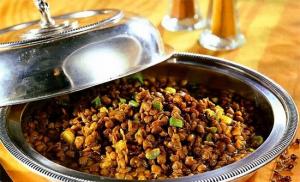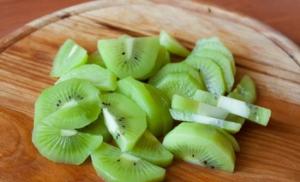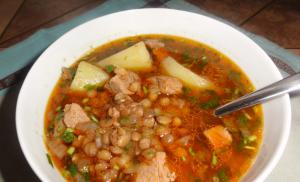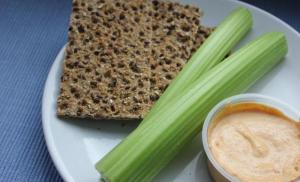What foods have anti-inflammatory properties. The Best Anti-Inflammatory Foods, Herbs and Spices
Pain, heat, redness, swelling are all signs of inflammation. In this way, the body activates its defenses to fight infection, cope with the consequences of injury or other causes of the disease. The classic way to relieve pain and inflammation is known to everyone. But before swallowing another pill, we suggest considering the alternatives that nature has offered us in abundance and have been successfully used for many centuries. Here are ten of the most effective products that may well become an alternative to anti-inflammatory drugs for chronic inflammation and their prevention.
1. Pineapple

Its fruits contain a unique enzyme, bromelain. It is able to influence the migration and activity of leukocytes - white blood cells that are involved in the fight against infection. Bromelain is good for acute and chronic inflammation, such as osteoarthritis - inflammation of the cartilage tissue of the joints, accelerates healing from injuries, and also improves digestion and promotes weight loss.
2. Algae

Seaweed has long helped residents of Japan cope with the most various diseases. As it turned out in last years, they contain fucoidan, a carbohydrate that has anti-inflammatory, antitumor and antioxidant properties. Perhaps soon a medicine against liver and lung cancer will be created based on brown seaweed extract. Types of algae such as kombu, wakame, and aram are rich in fucoidan. Their high fiber content promotes a feeling of fullness and promotes weight loss.
3. Green tea

The flavonoids included in its composition are powerful natural anti-inflammatory compounds. They have been shown in numerous studies to reduce the risk of heart disease and cancer. Green tea also contains a number of substances, such as vitamin C, that have antioxidant properties. They fight free radicals (remnants of molecules that cause tissue oxidation reactions) and thereby help curb the inflammatory process.
4. Ginger

Certain components of ginger, called gingerols, have a powerful anti-inflammatory effect. They block the production of biochemicals that promote inflammation, including lipoxygenase and cyclooxygenase. Ginger reduces pain in osteoarthritis and rheumatoid arthritis. Tea with ginger is also irreplaceable for colds. True, due to the burning taste and irritating effect on the mucous membrane, in diseases gastrointestinal tract it must be used with caution.
5. Turmeric

It is a yellow oriental spice often sold mixed with curry powder. It contains the compound curcumin, whose anti-inflammatory effect is comparable to that of drugs such as hydrocortisone and motrin, but without their side effects. In addition, curcumin has anti-inflammatory effects on the eyes and is useful for age-related retinal diseases.
6. Linseed oil

The oil obtained from flaxseed rarely causes allergies. It is especially beneficial for the skin as it helps cope with dermatitis, itchy skin and dryness. Flaxseed oil can lower cholesterol levels in the blood and prevent the formation of blood clots, normalize metabolism and metabolism in tissues and organs. Thanks to the content of special lignin substances, it helps prevent the division of cancer cells and slows down the growth of tumors.
7. Wheat bran

They are valuable not only for their abundance of minerals and vitamins B, A, E, but also for their high zinc content. This element is involved in metabolic processes, reduces inflammation and Negative consequences oxidative reactions, supports immunity, helps fight viruses. Wheat bran is also an effective means for losing weight, since due to the abundance of coarse fiber, it stimulates the self-cleansing of the intestines (but for the same reason they are contraindicated for gastritis and colitis).
8. Fish oil

It is fish oil that contains special long-chain polyunsaturated fatty acids of the omega-3 class: docosahexaenoic acid and eicosapentaenoic acid. They reduce inflammatory processes, block the production of a number of inflammatory agents, and prevent diseases of cardio-vascular system, some types of cancer, strengthen the immune system. The most “omega” acids are found in halibut, mackerel, salmon, sardines, mackerel, and herring. If you don't like fish, replace it with dietary supplements containing omega acids.
9. Celery

It is rich in apigenin, a substance that helps the body fight inflammatory processes, reduces vascular spasm, swelling and painful sensations. In addition, celery (especially its root) contains the microelement selenium, a powerful antioxidant that has a general strengthening effect on the body.
10. Shiitake

Since ancient times, this mushroom has been used in Chinese medicine due to its ability to strengthen the body's defenses. Later, scientists found that shiitake activates immune elements - macrophages and T-lymphocytes, and affects the production of the protective protein interferon. Lentinan, an immunostimulant used in the treatment of diabetes, cancer, and HIV infection, was isolated from shiitake. In addition, shiitake lowers blood cholesterol and normalizes blood pressure.
Inflammation can cause a range of health problems. Eating anti-inflammatory foods helps reduce inflammation, which naturally leads to improved overall health.
Inflammatory diseases
Inflammation is part of the body's natural defense process. When the body perceives danger, it triggers an inflammatory response in an attempt to heal itself. According to the University of Washington, chronic inflammation is caused by:
— diabetes second type;
- intestinal diseases;
— chronic pain;
- autoimmune diseases.
Certain foods help you better manage inflammation, which ultimately leads to better health. Please note that not all of them traditional medicine recognized as anti-inflammatory, so if you doubt the advisability of using them, talk to your doctor.
Fish
Fish and other seafood are full of Omega-3 fatty acids. Research shows that these acids reduce inflammation in the body as effectively as anti-inflammatory drugs such as NSAIDs.
Eating foods rich in Omega-3 helps maintain a balance of Omega-3 and -6 fatty acids in the body, which helps control inflammation. Here is a list of such fish and seafood:
— wild salmon from Alaska;
— arctic char;
- sardines;
- oysters;
- halibut;
- trout.
Walnuts
They, like fish, are famous for their high levels of Omega-3 fatty acids. Adding 30 grams of walnuts or a tablespoon of their oil to the foods you eat helps reduce inflammation.
Hot peppers
Hot peppers contain capsaicin, the anti-inflammatory effect of which was discovered back in 2003.
Chia seeds
According to the American Society of Nutrition, chia (Salvia sage) seeds have high levels of Omega-3. When soaked in liquid chia seeds form a gel. Try soaking them in almond milk and then combining them with berries for a delicious and healthy smoothie.
Ginger
Ginger has a strong anti-inflammatory effect. Adding grated ginger to food helps reduce inflammation.
Turmeric
Turmeric is another super spice renowned for its anti-inflammatory effects. Also try eating a little curry that contains turmeric.
Flax seeds
You can add flax seeds to your morning porridge, sprinkle them on fruit, or mix them with fruit puree. These small black seeds are great for calming inflammation because they also contain Omega-3 fatty acids.
Acai berries
These flavorful berries are high in Omega-3 fatty acids and antioxidants. You can buy frozen berries or try one of the many types of acai juice available in grocery stores.
Quinoa
These tasty grains are high in fiber and protein and have a low glycemic index. Studies have shown that eating foods low on the glycemic index but rich in fiber reduces biological markers of inflammation (such as C-reactive protein).
Green tea
A 2012 study of men with cancer prostate gland showed that green tea reduced biomarkers of inflammation in subjects. You don't need to consume large amounts of caffeine, but a daily cup of green tea will be very beneficial. There are many varieties of tea that are completely decaffeinated and can even be bought in the supermarket.
Leafy vegetables
Dark green leafy vegetables, high in fiber and nutrients and low on the glycemic index, reduce inflammation. This is, first of all:
- spinach;
- romaine lettuce;
- cabbage;
- chard;
- beet tops;
- mustard;
- broccoli;
Pro-inflammatory foods
When discussing anti-inflammatory foods, it is worth paying attention to pro-inflammatory ones. According to the University of Washington, if you want to reduce inflammation, you should avoid foods that support inflammation, including:
- red meat;
— dairy products;
- purified grain;
- products with artificial ingredients such as aspartame, artificial flavors and colors;
- oils such as soybean, cottonseed, corn, safflower and sunflower;
— products with preservatives;
- processed carbohydrates, including sugar and white flour.
Minimizing pro-inflammatory foods and focusing on anti-inflammatory foods can improve your health if you are experiencing an inflammatory response. An added bonus is that anti-inflammatory foods contain vitamins, minerals, fiber, enzymes, and phytochemicals that support good health.
Experts have published the results of a large study that shows that eating styles that lead to the development of systemic inflammatory reactions in the body significantly increase mortality and contribute to the development of cardiovascular diseases and cancer.
In numbers, these data look impressive. Those who consume the most inflammatory foods have a 22% risk of dying prematurely, a 24% risk of dying from cardiovascular disease (heart attack, heart failure, stroke, etc.), and a 28% risk of dying from cancer. Their risk of acquiring severe heart and vascular disease is 38% higher.
Not just infections
How to explain all this? We are accustomed to the fact that inflammation accompanies infections, and when they pass, everything returns to normal. And how are inflammation and food, inflammation and these serious diseases, inflammation and life expectancy connected?
One of the world's most authoritative life extension specialists, Alexey Moskalev, corresponding member of the Russian Academy of Sciences, professor, doctor of biological sciences, head of specialized laboratories at the Komi Institute of Biology, talks about this scientific center Ural Branch of the Russian Academy of Sciences and MIPT, and departments at Syktyvkar State University:
“The processes of inflammation themselves are associated with innate immunity and are initially designed to protect our body during infections and injuries. But these same processes can play a negative role both in a number of diseases and in the development of the aging process. For example, today it has already been established that chronic inflammation is the main factor in such age-related diseases as atherosclerosis, arthritis, cancer, diabetes, osteoporosis, senile dementia, Alzheimer's disease, cardiovascular diseases, obesity and metabolic syndrome. Inflammation promotes the formation of blood clots in blood vessels, inhibits the ability of cells to divide, causes insulin insensitivity, and activates the formation of harmful free radicals that damage DNA, membranes and proteins in cells.
Inflammatory processes arise as a result of a whole complex of changes in the body. They can occur in response to the accumulation of damage in cells and organs with age. The cause of inflammation in the body may be overweight: adipose tissue- a source of so-called inflammatory cytokines that trigger this process. There are many other mechanisms and influences that cause chronic systemic inflammation in the body.

Food is very important
Nutrition plays an important role in this. For example, inflammatory processes occur when eating fried foods (french fries, etc.), sweet soda, refined carbohydrates ( White bread, baked goods), margarine, lard, red and highly processed meat (burgers, steaks, sausages, sausages). The fact is that these products can contain so-called advanced glycation end products (AGEs), as well as saturated and oxidized fats, and all of them, when they enter our body, cause an inflammatory response. By the way, the formation of AGEs prevents cooking food at temperatures less than 120 degrees. For example, you can use the following methods heat treatment, like boiling, steaming and stewing.
And there are foods that, on the contrary, have an anti-inflammatory effect. These include tomatoes, fruits and berries (apples, strawberries, blueberries, oranges, cherries), nuts (almonds, walnuts), olive oil, leafy vegetables (spinach, kale), fatty fish (salmon, mackerel, tuna, sardines), coffee, green tea. All of them contain polyphenols, omega-3 fatty acids and other biological active substances, which suppress the activity of inflammatory enzymes.
Our own research has shown that pectins have anti-inflammatory properties. These substances from apples and citrus fruits have been shown to increase lifespan in animal experiments. They, like cellulose, prevent the absorption of fast carbohydrates, softening them Negative influence to your health. In addition to apples and citrus fruits, pectins are found in peaches, apricots, currants, gooseberries and other berries, as well as in potatoes, beets, carrots and onions.
What follows from all this?
You need to reduce inflammation and avoid everything that causes it - colds and other infections, dysbacteriosis, allergic reactions. Get regular vaccinations. Remember, the less often your body experiences inflammation, the slower it ages.
And nutrition plays a very important role in this. Studies have shown that an anti-inflammatory diet has beneficial effects on health and aging, and even slowed the shortening of telomeres, the structures located at the ends of chromosomes. With each cell division they shorten. Their length is a very important indicator of the rate of aging. Long-term measurements have shown that people with short telomeres have higher rates of aging and an increased likelihood of cardiovascular problems, cancer and other age-related diseases.
We already understood that to protect against inflammation it is very important proper nutrition. But after a new large-scale study published recently, this has become even more obvious. The Chinese scientists who conducted it combined nine large studies conducted earlier, which involved 134,067 people. "They re-evaluated them (meta-analyses) and showed conclusively that diet plays a significant role in the development of inflammation, associated diseases and earlier mortality."

Inflammation is part of the body's immune response to remove harmful stimuli, including damaged cells, irritants, or a pathogen.Inflammation can help heal infections, wounds, and tissue damage. However, when it gets out of control, it can actually damage the body.Inflammation can be acute or chronic. Acute inflammation It starts quickly and becomes severe quickly, with symptoms usually lasting for a week or two. On the other hand, chronic inflammation can last from several months to several years. In this article we will look at various anti-inflammatory foods.
Symptoms of inflammation include red, swollen joints that feel hot to the touch, joint pain, joint stiffness, and loss of joint function. Inflammation can also cause common flu symptoms such as fever, chills, loss of energy, headaches, loss of appetite and muscle stiffness. Often only a few of these symptoms are present with inflammation.
A large number of health problems are associated with inflammation. These include: acne, asthma, sinusitis, atherosclerosis, periodontitis, celiac disease, hay fever, chronic prostatitis, inflammatory diseases intestines, ulcerative colitis, Crohn's disease, rheumatoid arthritis, interstitial cystitis and even cancer.If you want to stay healthy, it is important to control inflammation in your body by following healthy image life and diet. Many foods have anti-inflammatory properties that can help prevent and fight inflammation. .
Anti-inflammatory foods for the body
- Olive oil.
Olive oil may provide protection against inflammation due to its beneficial compounds. A 2011 study published in Current Pharmaceutical Engineering found that a compound called oleocanthal in olive oil prevents the body from producing COX-1 and COX-2 enzymes that cause inflammation.When it comes to fighting inflammation, always choose extra virgin olive oil. It may even reduce the risk of diseases associated with inflammation, such as degenerative joint disease or diabetes. Use this oil for cooking and making healthy salad dressings.
Warm olive oil, used as a massage oil, helps reduce pain, swelling and inflammation from arthritis and muscle cramps.
- Ginger.
Ginger contains a compound known as gynerol, which has anti-inflammatory properties. According to a 2005 study published in the Journal of Medicinal Foods, ginger affects certain inflammatory processes on cellular level. This makes it effective means treatment of both acute and chronic inflammatory diseases.People with osteoarthritis or rheumatoid arthritis report reduced pain and swelling along with improved mobility after consuming ginger on a regular basis. Ginger can also reduce inflammation after exercise.
You can use dried or fresh ginger root to make ginger tea. Drink ginger tea 2 or 3 times a day. To reduce inflammation, you can even massage the affected area with ginger oil several times a day. Ginger capsules provide better benefits than other forms. Consult your doctor for the correct dosage.
Note: Avoid consuming too much large quantity ginger, as it can thin the blood. .
- Turmeric.

This popular yellow spice used in Indian cooking also helps prevent inflammation. The active ingredient curcumin in turmeric is an antioxidant that has anti-inflammatory properties and is isolated from anti-inflammatory foods.According to a 2003 study published in the Journal of Alternative and Complementary Medicine, researchers reviewed many studies on curcumin and concluded that it inhibits a number of different molecules that play a role in inflammation.
Turmeric is very effective in reducing inflammation due to arthritis, muscle strains and other injuries. You can use turmeric powder in your kitchen to prevent inflammation in the body.You can also drink a cup of turmeric tea or a glass of hot turmeric milk 1 or 2 times a day. A paste prepared with turmeric powder and warm sesame oil applied externally to the skin helps reduce inflammation and swelling. Do not apply this turmeric paste on damaged skin.
Turmeric is also available as food additives. However, you should only take supplements under the guidance of a doctor.
- Garlic.
A 2012 study published in the Journal of Medicinal Products found that several compounds in garlic have anti-inflammatory therapeutic potential. In fact, another study identified four different sulfur-containing compounds in garlic that help shut down pathways that lead to inflammation.
Eat 2 to 3 cloves of garlic daily on an empty stomach to prevent inflammation. Also, use garlic in your cooking as much as possible.
You can also rub garlic oil directly onto the affected area to relieve pain and inflammation. Another option is to take garlic capsules as a dietary supplement, but only after consulting your doctor.
- Cherry.

In a 2010 study, researchers from Oregon Health and Science University found that people who drank juice made from cherries saw a decrease in the level of inflammation in their bodies.Drinking cherry juice regularly in the week before an intense run can also help minimize post-run muscle soreness and inflammation.Experts recommend eating 1.5 cups of cherries or drinking 1 cup of cherry juice once a day. To enjoy the anti-inflammatory benefits, drink unsweetened juice made from fresh, organic, tart cherries.
Note: Cherry juice may cause abdominal discomfort and diarrhea. If you are experiencing these side effects, stop drinking juice. .
- Salmon.
Cold-water fish such as salmon are high in omega-3 fatty acids, such as eicosapentaenoic acid (EPA) and docosahexaenoic acid (DHA), which help reduce inflammation. Research shows that these fatty acids play a key role in reducing cytokine levels in the body. Cytokines are compounds that promote inflammation.
To enjoy the anti-inflammatory properties, eat salmon baked or fried, as overcooking can destroy healthy fats. The American Heart Association recommends eating salmon 2 or 3 times a week.
If you don't like the taste of fish, opt for fish oil supplements to reduce inflammation. However, consult your doctor before taking it.
- Sweet potato.

Sweet potatoes, especially the purple variety, can help heal inflammation in the body. A 2011 study published in the Journal of Medicinal Products reports that sweet potatoes have anti-inflammatory potential due to their concentration of nutrients.The high content of vitamins C and E and the carotenoids alpha and beta carotene help reduce pain and inflammation in the body.Regular consumption of sweet potatoes can help reduce inflammation in nerve tissue throughout the body.
Eat at least 1 bowl of sweet potatoes on a daily basis. You can use sweet potatoes to make French fries, pancakes, cookies and chips.
- Spinach.

This dark leafy green vegetable can greatly help prevent as well as reduce inflammation. Spinach contains many carotenoids, which act as antioxidants that reduce inflammation, and vitamin E. These components help protect the body from pro-inflammatory molecules called cytokines.Additionally, spinach is a good plant source of alpha-linolenic acid, which acts as a potent anti-inflammatory food to reduce pain and inflammation. Spinach may help reduce asthmatic inflammation, arthritis pain, and migraine headaches.
You can enjoy this green vegetable in salad form, vegetable juice or a green smoothie. In addition, spinach can be added to soups, side dishes or omelettes.
- Walnuts.
Another good anti-inflammatory food is walnuts. Omega 3 type fatty acid which reduces inflammation in the body.A 2004 study published in the journal Nutrition found that people who consumed at least 50-80 grams of walnuts daily had reduced levels of inflammatory markers such as C-reactive protein (CRP).Regular consumption of walnuts may help prevent chronic diseases, such as heart disease and arthritis, and promote bone health. .
Soak 3 - 4 walnuts in water overnight. The next morning, eat these soaked walnuts with your breakfast or as a healthy afternoon snack. You can also include walnuts in smoothies, cereals, or baked goods.
- Blueberry.
Several phytonutrients in blueberries, such as anthocyanins, hydroxycinnamic acids and flavanols, act as antioxidants and anti-inflammatory compounds in the body.These phytonutrients reduce inflammation in tissues by increasing the functionality of cell membranes to deliver important nutrients and chemical processes in cells. Additionally, blueberries are low in fat and calories.
Regular consumption of blueberries reduces the risk of developing arthritis and may help protect against intestinal inflammation and ulcerative colitis. We recommend 1 serving (about 1/2 cup) of blueberries per day.
You can include blueberries in smoothies, fruit salad, cereals and baked goods.
Inflammatory processes in the body are part of the immune system's response. Inflammation tells you about a wound or injury: throbbing and swelling indicate that the immune system is working to restore health. However, sometimes these processes get out of control. Inflammation can be exacerbated by lack of sleep, increased level stress, genetics or harmful products in the diet. If you want to restore the normal state of your body, you should learn about which foods reduce the intensity of inflammatory processes. Many also help to get rid of excess weight. 
Blueberry
Studies have shown that eating berries daily can seriously reduce inflammation. In addition, berry-based drinks help neutralize the inflammatory effects of foods rich in fat and carbohydrates. How does this happen? The thing is that berries contain antioxidants that affect immunity genes and inflammatory processes. In addition, blueberries contain a lot of vitamin C and polyphenol. 
Cereals
Eat oatmeal for breakfast to reduce inflammation and get rid of belly fat. Oatmeal contains healthy carbohydrates, feeding intestinal bacteria. These bacteria produce fatty acids that stimulate the oxidation of fat stores in the body. 
Ginger
Researchers link beneficial features ginger for health with antioxidants, characterized by anti-inflammatory, antibacterial effects. Ginger blocks genes and enzymes that cause inflammation. As part of the experiment, rats with rheumatoid arthritis were given ginger extract. Joint swelling and inflammation in animals decreased. 
Green tea
This is a great tool for losing weight. The benefits of green tea come from catechins, antioxidants concentrated in the leaves. This drink actively fights inflammation and prevents the development of tumors on the skin. 
Dark chocolate
Good news for all chocolate lovers! Recent studies have shown that the antioxidants present in cocoa prevent weight gain and lower blood sugar levels. In addition, microbes in the gut were found to convert chocolate into heart-healthy anti-inflammatory compounds. 
Salmon
There are a variety of fats that you should consume more of. We're talking about Omega-3 fatty acids. These healthy fats famous for their anti-inflammatory properties. Their best source is fatty fish. Eating salmon increases levels of adiponectin, a hormone that increases the muscle's ability to draw energy from carbohydrates and speeds up metabolism. 
Red pepper
Peppers are an excellent anti-inflammatory food that contains a lot of vitamin C, beta-carotene and others. useful substances, neutralizing free radicals. Beta-carotene can even fight cancer and reduce the likelihood of developing diseases such as asthma and rheumatoid arthritis. 
Turmeric
Turmeric contains substances with powerful anti-inflammatory and antioxidant effects. Add this seasoning to your meals to protect your cognitive abilities, promote liver and heart health, and avoid joint inflammation and arthritis-related pain. 
Beet
Beets are a source of a variety of nutrients, as well as unique pigments that have antioxidant effects. Eating beets strengthens metabolism, improves mood and turns off genes that lead to fat accumulation. Beets reduce inflammation levels in the body and stabilize blood pressure. 
Broccoli
Broccoli contains many substances that protect against inflammation, as well as vitamin K, which helps improve the condition of the body. Just remember that broccoli should not be eaten raw by people who are allergic to pollen! 
Black beans
Black beans contain beneficial fiber, which has a beneficial effect on intestinal health. A small serving of beans also contains twenty grams of protein. This great product for people on a diet, rich in antioxidants and helping to reduce the intensity of oxidative and inflammatory processes. 
Olive oil
Olive oil has an intensive effect on inflammatory processes and restores joints. This product has effects similar to those of ibuprofen. 
Tomatoes
Tomatoes are an excellent source of lycopene, an antioxidant that protects the brain and helps fight depression. Lycopene is found in the skin, so try to eat cherry tomatoes more often. Cooked tomatoes are also good; they contain even more lycopene than fresh ones. 
Chia seeds
These seeds are high in healthy fats, fiber and ample protein. Thanks to this, chia seeds stabilize blood sugar levels, stimulate weight loss, suppress appetite and even help maintain fluid levels in the body. 
A pineapple
Pineapple contains bromelain, an enzyme that has a powerful anti-inflammatory effect. It reduces asthma symptoms and helps you recover faster after exercise. 
Spinach
Spinach has an intense effect on inflammatory processes. It is rich in carotene and vitamins C, E and K, which protect the body. A form of vitamin E known as alpha-tocopherol protects artery health. 
Whole grains
Brown rice, quinoa, millet and amaranth are full of fiber, which helps turn off genes that cause inflammation. The high content of B vitamins also helps improve health. 
Eggs
Eggs are high in vitamin D, which not only strengthens bones, but also helps fight depression and colds, reduces the risk of certain types of cancer and reduces the intensity of inflammatory processes. Research has shown that there is a link between low levels of this vitamin and inflammation. 
Garlic
Garlic helps protect the body from colds. It blocks enzymes that cause bacterial and viral infections. 
Oysters
This product contains beneficial enzymes that work as antioxidants, deactivating free radicals that harm cells. 
Kamut
This is an unusual product that is an exotic variety of wheat. Kamut is rich in magnesium, potassium, iron, and is also full of healthy fiber. 
Yogurt
Developing good microflora is of great importance for good health, especially when it comes to fighting inflammation. Yogurt rich in probiotics can help to obtain such microflora. 
Apples
Apples are high in fiber, so they help your intestines work properly. In addition, apples contain pectin, which also has a positive effect on the body. 
Nuts
Nuts are high in Omega-3 fatty acids, as well as vitamin E, which has an antioxidant effect. 
Canned tuna
According to research, tuna contains a very effective form of Omega-3 fatty acid. Choose low-fat canned foods to include in your diet. 
Rosemary
This is a wonderful seasoning that is very rich in antioxidants. Add it to your food as often as possible. 
Bone broth
Boiling bones releases collagen and other nutrients into the water. This broth is rich in amino acids and gelatin, which restores microflora. 
Coconut oil
Few people know that this product has anti-inflammatory properties. Studies have shown that coconut oil is effective in fighting various diseases. 
Honey
Honey contains many beneficial enzymes that relieve the symptoms of inflammatory diseases. 
Miso paste
This Japanese product contains many probiotics, in addition, it copes well with inflammatory processes.













